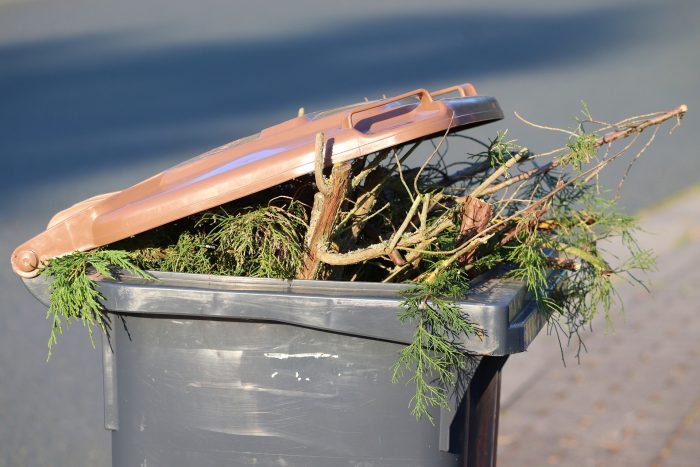Garbage grief: PJ Village and DEC clash over landfill permit
The Village of Port Jefferson is in a complicated permit dispute with the New York State Department of Environmental Conservation over its solid waste landfill at Harbor Hills.
The Port Jefferson Village Clean Solid Waste Landfill, a 1.9-acre kettle hole located on the Port Jefferson Country Club property, has been historically operated to facilitate branch and leaf removal services in the village. In 2017, the small landfill was impacted by changes in state regulations, throwing the future of these services into question.
In an exclusive interview, Mayor Margot Garant summarized the nature of the permit dispute between the village and DEC. For decades, the government has renewed its DEC permit every five years to continue operating the landfill. With its permit set to expire on Dec. 11, the village reapplied but met unforeseen resistance.
“Unbeknownst to us in 2017, there were changes in some of the regulations concerning landfills throughout New York state, and they became much more strict,” Garant said. “We got a letter that we weren’t meeting the needs of the new statutory regulations for landfills.” She added, “They basically had classified our little kettle hole to be regulated like a landfill equivalent to the Town of Brookhaven [landfill].”
Garant referred to the pre-2017 regulations as manageable for the village, requiring breakdown and transport of the debris, among other workable conditions. The new rules, however, will “be impossible for us to comply with,” the mayor said.
An unusual landfill
David Tonjes is a research associate professor at Stony Brook University’s Department of Technology and Society. His research focuses on solid waste management and the environmental impacts of landfills.
While the Port Jefferson site is officially listed as a landfill regulated under the Long Island Landfill Law, Tonjes described it as distinct from other landfills throughout the area.
“It’s unusual because it doesn’t have a liner system, which is required for all landfills on Long Island,” he said. “As far as I know, it doesn’t have any landfilling functions, which is to take things in, cover them up, and manage the gas and leachate [that are] generated when you do that sort of thing.”
Garant agreed that the landfill does not fit neatly into a conventional classification category, given its prior use. Consequently, the village government is considering entering into negotiations with DEC to reclassify the landfill as a transfer station.
Garant said a change of classification could enable the village to continue using the site. “We realized we were managing this more like a transfer station than we were a landfill, and that’s going to be our approach with the DEC,” the mayor said. “As a transfer station, it means that [branches and leaves] are held here on a temporary basis, broken down and relocated, just like we were doing.”
She added, “If we have to abandon the kettle hole, we then have to put a barrier down, backfill it with clean fill, bring up the grade, and that’s going to cost us approximately $500,000 to do that, to abandon it.”
Tonjes said the Port Jeff landfill seems to fit some of the conditions for a transfer station. However, he noted that DEC guidelines for transfer stations are generally restrictive.
“Typically, a transfer station is a site where waste comes in and is kept under a roof for a period of time, and then it’s moved out to either a reuse point or disposal point,” he said. Depending on the materials stored, that temporary window of time could be as small as 24 hours.
An uncertain future
Conflicts with DEC over the long-term storage of branches and brush are not unique to Port Jefferson. Tonjes said several towns along the East End had met stiff opposition from DEC due to accumulations of storm debris.‘It calls for a degree of technical oversight and awareness that may be too expensive for the village to do.’
— David Tonjes
Such materials, if processed promptly, could have been reused. “When they grind it up, they end up with a pile of wood chips that no one really wants,” the associate professor said. “They’re really low-value material, they end up with stuff that should have been reused.”
Tonjes suggests Port Jeff is entangled within a broader conflict within New York state over the reuse of organic waste. By cracking down on the long-term storage of organic waste, DEC aims to reuse these materials before their reuse value diminishes.
While municipalities have historically been responsible for waste disposal functions, this may soon change. Given the ballooning costs associated with managing solid waste, Tonjes suggests these may soon be too burdensome for a small municipality such as the village.
“With the village being such a small entity and trying to run its own — in a sense — disposal facility, it calls for a degree of technical oversight and awareness that may be too expensive for the village to do,” he said.
Further complicating matters is the state’s Climate Leadership and Community Protection Act. This 2019 law mandates New York to reduce economywide greenhouse gas emissions by 40 percent by 2030 and no less than 85 percent by 2050 from 1990 levels.
Enforcing these standards, Tonjes said, would require the complete overhaul of the state’s waste management apparatus.
Under this law, “all government actions have to comply with the notion of minimizing greenhouse gas emissions,” he said. “Almost all solid waste activities involve greenhouse gas emissions, so it’s clear that solid waste management will have to change dramatically to account for this new law.”
Meanwhile, Garant admitted that the changes in state law blindsided the village. For her, the permit controversy with DEC offers a window into the challenges small municipalities encounter when interfacing with higher levels of government.
“When large government makes change to a section of the code, they really don’t know the trickle-down impacts that they are making,” she said. “Wanting to be in full compliance, making an application six months ahead of time, now I’m in a situation where I’m in the middle of branch and leaf pickup, and I’m going to have a permit expiring.”
Tonjes said conversations surrounding solid waste management are only getting started. He suggests that finding a workable solution to these complex problems requires significant coordination between all levels of government.
“The future is going to get very interesting in terms of regulating how the state manages its garbage,” he said.







